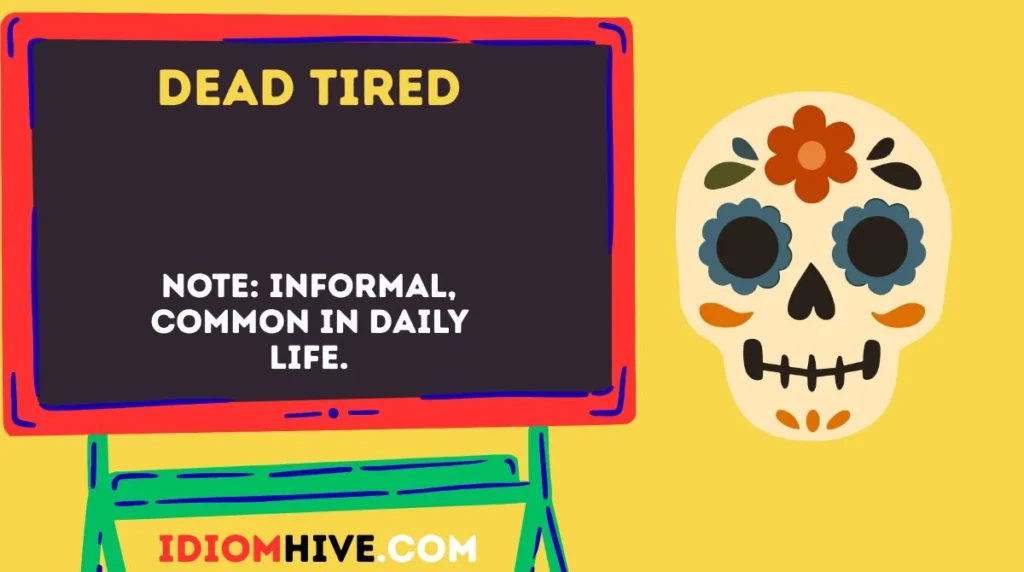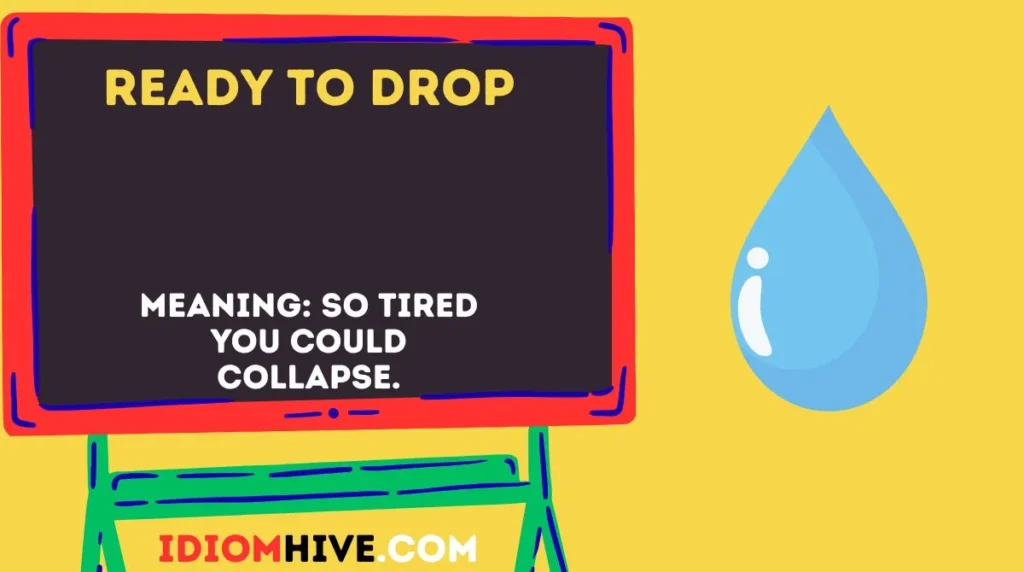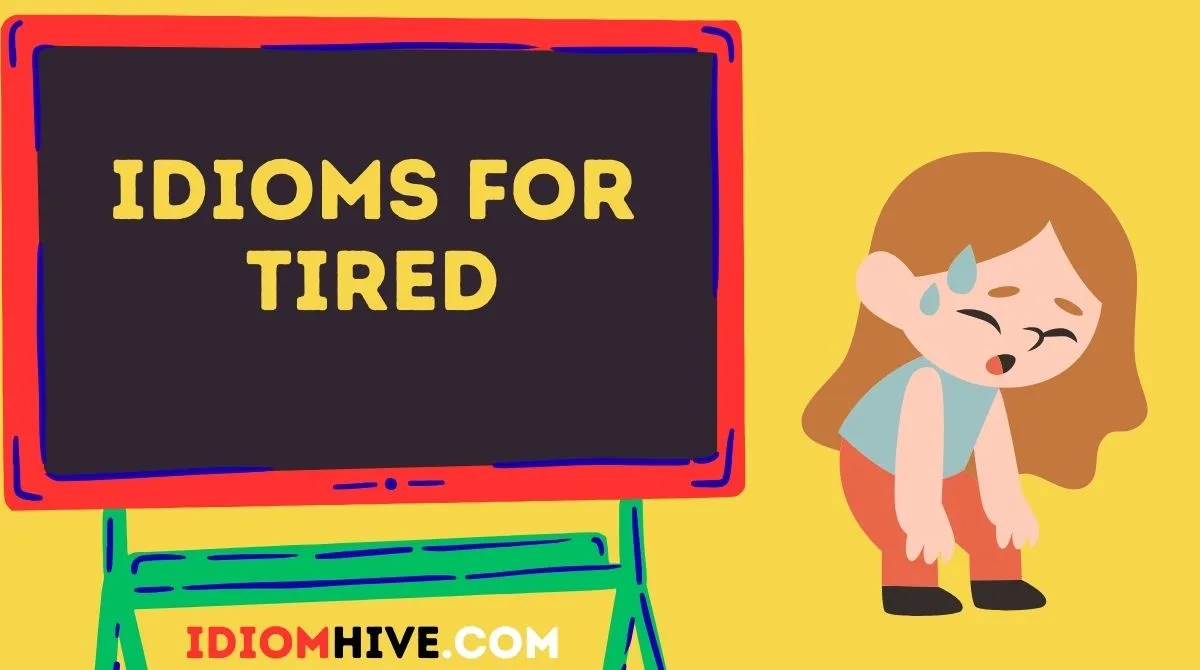Feeling tired is something we all experience—after a long day at work, pulling an all-nighter, or simply doing too much. But instead of just saying “I’m tired,” English offers dozens of colorful idioms to describe different levels of exhaustion.
Idioms are short, catchy phrases with meanings that aren’t always obvious from the words themselves. They make language more fun, expressive, and memorable.
Idioms for being tired are especially useful because they help us communicate how exhausted we really feel—whether it’s a little worn out or completely drained.
By using them, you sound more natural and fluent in conversations, storytelling, or even professional communication. Plus, they add variety, so you don’t repeat the same plain word “tired” again and again.
Let’s explore some of the most popular idioms for tiredness, grouped by type, with meanings, examples, and tips on usage.
Did You Know?
The English idiom “burning the candle at both ends” first appeared in the 18th century. Interestingly, people used candles not just for light but also as a symbol of energy and time. So, when you “burn the candle at both ends,” you’re using up all your energy too quickly—just like a candle that burns down fast from both sides.
Idioms About Being Extremely Tired
Dead Tired

Meaning: Completely exhausted.
Example: After running the marathon, she was dead tired.
Similar Idiom: Dog-tired.
Note: Informal, common in daily life.
Dog-Tired
Meaning: Very tired, almost too tired to move.
Example: I was dog-tired after cleaning the entire house.
Similar Idiom: Worn out.
Note: Informal, often used in casual speech.
Worn Out
Meaning: Physically or mentally exhausted.
Example: He was worn out after back-to-back meetings.
Similar Idiom: Burnt out.
Note: Common in both casual and professional settings.
Beat
Meaning: Extremely tired.
Example: I’m beat after working double shifts.
Similar Idiom: Spent.
Note: Informal, American English.
Dead on One’s Feet
Meaning: So tired you can hardly stand.
Example: The nurses were dead on their feet after a long night shift.
Similar Idiom: Ready to drop.
Note: Often used for people in jobs requiring long hours.
Bone-Tired
Meaning: Exhausted down to the bones.
Example: He was bone-tired after hiking all day.
Similar Idiom: Weary to the bone.
Note: Used in everyday conversations.
Out Like a Light
Meaning: Falling asleep immediately.
Example: As soon as he hit the bed, he was out like a light.
Similar Idiom: Fast asleep.
Note: Casual, often used for storytelling.
Ready to Drop

Meaning: So tired you could collapse.
Example: She was ready to drop after hours of shopping.
Similar Idiom: Dead on one’s feet.
Note: Informal, expressive.
Spent
Meaning: Having no energy left.
Example: After the exam, I felt completely spent.
Similar Idiom: Drained.
Note: Common in professional and personal settings.
Drained
Meaning: Extremely low on energy, often emotionally too.
Example: He felt drained after the stressful meeting.
Similar Idiom: Exhausted.
Note: Neutral, works in both casual and professional English.
Idioms About Sleepiness
Sleepyhead
Meaning: Someone who is very sleepy or slow to wake.
Example: Come on, sleepyhead, it’s time for breakfast.
Similar Idiom: Drowsy.
Note: Friendly and playful.
Nodding Off
Meaning: Dozing or falling asleep unintentionally.
Example: I kept nodding off during the lecture.
Similar Idiom: Dozing off.
Note: Informal.
Doze Off
Meaning: Fall asleep suddenly, often in a chair or class.
Example: She dozed off while watching TV.
Similar Idiom: Drift off.
Note: Common in daily life.
Drift Off
Meaning: Slowly fall asleep.
Example: He drifted off while reading a book.
Similar Idiom: Drop off.
Note: Neutral and descriptive.
Drop Off
Meaning: To fall asleep suddenly.
Example: The baby dropped off after crying for hours.
Similar Idiom: Knock out.
Note: Often used informally.
Out Cold
Meaning: Fast asleep or unconscious.
Example: He was out cold after drinking too much.
Similar Idiom: Out like a light.
Note: Informal, casual use.
Hit the Sack
Meaning: Go to bed to sleep.
Example: I’m going to hit the sack early tonight.
Similar Idiom: Hit the hay.
Note: Very common, informal.
Hit the Hay
Meaning: To go to sleep.
Example: It’s late, let’s hit the hay.
Similar Idiom: Turn in.
Note: Informal, everyday speech.
Turn In
Meaning: To go to bed.
Example: I think I’ll turn in for the night.
Similar Idiom: Call it a night.
Note: Slightly more formal than “hit the hay.”
Catch Some Z’s
Meaning: Sleep for a while.
Example: I need to catch some Z’s before the meeting.
Similar Idiom: Grab forty winks.
Note: Casual and playful.
Grab Forty Winks
Meaning: Take a short nap.
Example: He grabbed forty winks during his lunch break.
Similar Idiom: Catnap.
Note: Informal.
Catnap

Meaning: A very short nap.
Example: She took a quick catnap before heading out.
Similar Idiom: Power nap.
Note: Casual and common.
Power Nap
Meaning: A short, refreshing nap.
Example: I had a power nap and felt much better.
Similar Idiom: Catnap.
Note: Used in both casual and work settings.
Idioms About Overwork and Burnout
Burn Out
Meaning: Exhaustion from too much work or stress.
Example: He burned out after years of working without a break.
Similar Idiom: Worn out.
Note: Common in professional settings.
Running on Empty
Meaning: Continuing to work with no energy left.
Example: I’m running on empty after staying up all night.
Similar Idiom: Out of steam.
Note: Used for work and studies.
Out of Steam
Meaning: No longer have energy to continue.
Example: The project team is out of steam after weeks of hard work.
Similar Idiom: Running on fumes.
Note: Often professional.
Running on Fumes
Meaning: Operating with almost no energy.
Example: By morning, we were running on fumes.
Similar Idiom: Running on empty.
Note: Informal but clear.
Burn the Candle at Both Ends
Meaning: Overwork by staying up late and waking up early.
Example: She’s been burning the candle at both ends preparing for exams.
Similar Idiom: Overdo it.
Note: Common, slightly formal.
Work One’s Fingers to the Bone
Meaning: Work very hard until exhausted.
Example: He worked his fingers to the bone to provide for his family.
Similar Idiom: Slaving away.
Note: Used in storytelling and formal writing too.
Slaving Away
Meaning: Working extremely hard.
Example: She’s been slaving away at her desk all week.
Similar Idiom: Work one’s fingers to the bone.
Note: Informal.
All Work and No Play
Meaning: Too much work makes life dull.
Example: Don’t be all work and no play—you’ll burn out.
Similar Idiom: Overwork.
Note: Often used as advice.
Carry the Weight of the World
Meaning: Feeling exhausted from too many responsibilities.
Example: He looks like he’s carrying the weight of the world on his shoulders.
Similar Idiom: Burdened.
Note: Emotional as well as physical tiredness.
Dead Weight
Meaning: Something or someone that is a burden.
Example: Carrying that box was like dragging dead weight.
Similar Idiom: Heavy load.
Note: Literal and figurative.
Idioms About Mental and Emotional Fatigue
Brain Dead
Meaning: So tired you can’t think clearly.
Example: I was brain dead after the long meeting.
Similar Idiom: Mind-numbed.
Note: Casual, not used formally.
Zonked
Meaning: Extremely exhausted.
Example: I was zonked after traveling all day.
Similar Idiom: Wiped out.
Note: Informal, American slang.
Wiped Out
Meaning: Very tired, almost like knocked down.
Example: He looked wiped out after practice.
Similar Idiom: Exhausted.
Note: Commonly used casually.
Knackered
Meaning: Very tired (British English).
Example: I’m absolutely knackered after today’s work.
Similar Idiom: Shattered.
Note: British informal.
Shattered
Meaning: Extremely tired or broken down.
Example: She was shattered after her long journey.
Similar Idiom: Knackered.
Note: British informal.
Fatigued
Meaning: Weakened and tired.
Example: He felt fatigued after the surgery.
Similar Idiom: Weary.
Note: More formal, medical or professional.
Weary
Meaning: Tired due to strain or stress.
Example: She grew weary of waiting.
Similar Idiom: Exhausted.
Note: Can be formal and poetic.
Lethargic
Meaning: Lacking energy and motivation.
Example: He felt lethargic after the heavy meal.
Similar Idiom: Sluggish.
Note: Formal or medical use.
How to Use These Idioms in Daily Life
- Speaking: Instead of saying “I’m tired,” try “I’m running on fumes” to sound more natural.
- Writing: In storytelling, idioms like “out like a light” make descriptions vivid.
- Professional Use: Use softer idioms like “worn out,” “drained,” or “burnt out” to describe fatigue in work emails or presentations.
Common Mistakes Learners Make With Idioms
- Wrong usage: I hit the sack of work yesterday.
Correct: I hit the sack early yesterday. - Mixing idioms: I was bone-beat tired.
Correct: Choose one: I was bone-tired or I was beat. - Too formal with slang: Writing “I was zonked” in a professional email.
Correct: Use “I was exhausted” or “I was drained.”
FAQs
1. What are idioms for tiredness?
Idioms for tiredness are expressions that describe different levels of exhaustion in a colorful way, like “dog-tired” or “burn out.”
2. Are idioms formal or informal?
Most idioms for tiredness are informal, but some like “fatigued” or “weary” can be used in formal settings.
3. Can I use idioms in professional English?
Yes, but choose wisely. Avoid slang like “zonked,” and use “drained” or “burned out.”
4. What’s the difference between “hit the sack” and “hit the hay”?
Both mean going to sleep, and they’re interchangeable.
5. Why should I learn idioms?
They make your English more natural, expressive, and closer to how native speakers talk.
Conclusion
Tiredness is universal, and English has no shortage of idioms to describe it. From being “dead tired” to “running on fumes,” these expressions add color, humor, and precision to your language.
Whether you’re chatting with friends, writing creatively, or expressing exhaustion at work, idioms give you the perfect way to say how drained you feel.
So next time you’re exhausted, don’t just say “I’m tired”—choose one of these idioms and make your English sparkle.










